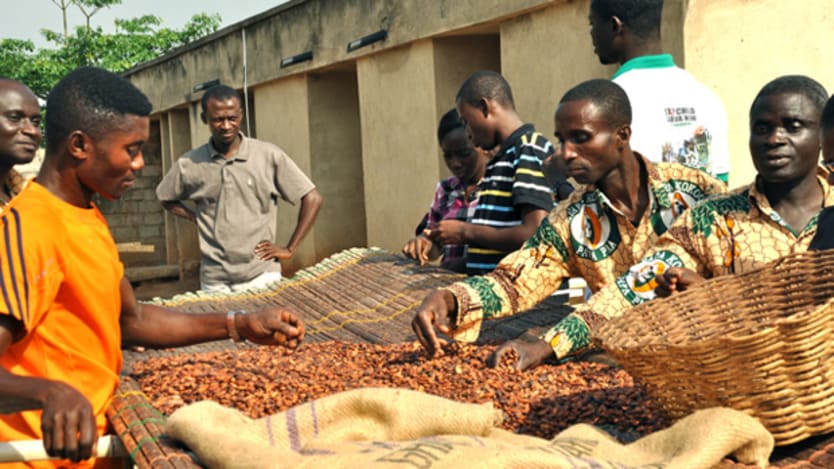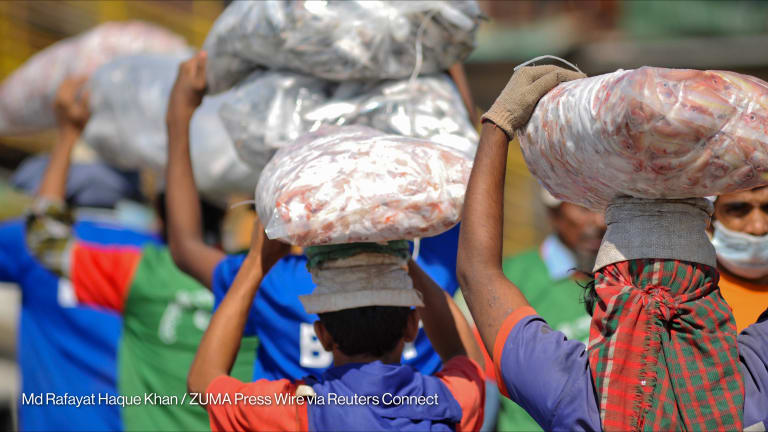
Demand for chocolate is rising and cocoa prices are at a three-year high, but the majority of farmers growing the crop remain in poverty.
Cocoa farmers face a number of challenges: small plots of land, aging trees that are less productive and small profits that make it difficult to support themselves and send their children to school.
“Income to farmers are not enough to lift them out of poverty,” Yaw Osei-Owusu, Conservation Alliance International’s country director in Ghana, told Devex in a video interview.
There’s a growing recognition that more must be done not only to improve cocoa farmers livelihoods but to make it an attractive job for future generations to ensure a sustainable supply. Companies that rely on steady, quality cocoa are seeing these challenges, and are working to tackle them — individually and through the newly launched Cocoa Action platform
Challenges
There are many factors holding back cocoa farmers from escaping poverty, and one of the main problems that unlike with other crops, cocoa farmers don’t have much control over decision-making.
In Ghana, for instance, cocoa is largely purchased and sold through the government, which keeps some of the money to run programs to support farmers and improve infrastructure. That also means that less of the sales prices makes its way back to the farmers and any additional funds they may get as a result of fair trade or other special certifications is insignificant, Osei-Owusu said.
See more #FeedingDev videos:
● Securing the future of cocoa
● Roger Thurow: Global malnutrition is a challenge to the worldwide economy
● Supply chain sourcing in fragile states: Lessons from Sainsbury in DRC
● Food security is land security
Many cocoa farms are very small and get further divided among children through inheritance. Those with small plots of land may struggle to produce enough cocoa to make it a viable livelihood, Bill Guyton, president of the World Cocoa Foundation, told Devex.
One way to address that is by helping bring farmers together, such as through farmer cooperatives, to make it easier for them to access inputs and markets at a scale that limits costs, he said.
Another key challenge is that many cocoa trees are well past their prime and are not producing enough cocoa for farmers to break out of the poverty cycle, noted Sona Ebai, chief of party of the World Cocoa Foundation African Cocoa Initiative.
What’s needed is to roughly double production through a value chain approach that helps farmers access a full package of inputs, better agricultural practices and greater diversification on the farm.
Most cocoa trees take three to five years to produce a crop, which can present a challenge to replacing the aging tree population, Ebai said. Farmers need to better identify and track the production for each tree and over time replace them with new, more productive trees.
Research breakthroughs may also change that timeline — new cocoa crop types are cutting down the time it will take for a new tree to yield cocoa.
Along with the trees, cocoa farmers are also aging and youth in those communities do not see it as an appealing career option. This worries all actors in the cocoa supply chain who rely on long-term, high-quality cocoa production.
Young people see a job that requires a tremendous amount of work that results in struggles to support families in places often far from the internet, power and water that they desire, Ebai said.
Conservation Alliance is working with youth in cocoa farming communities to help get them interested in cocoa. Osei-Owusu said they’ve identified what the youth want and have created information centers with computers in an effort to make cocoa more appealing and give them the access they desire, as well as experimenting with innovative technologies. And this is critical as governments, businesses and development agencies continue to work in this space that they listen to the farmers and define poverty in their terms.
Businesses
Cocoa companies are interested in addressing some of these challenges to ensure that they can continue to have a place to source what is for many of them a key ingredient.
Businesses have to play a part in answering the question because if cocoa farmers cannot rise above poverty then there will not be a sustainable supply of cocoa, Paul Bakus, Nestlé's president of corporate affairs, explained in a video interview with Devex.
“The approach we have to put in place has to do enough to raise the incomes of the farmer to the point where it can lift them out of poverty but also have an impact on their family in other ways” such as sending children to school, he said.
As part of that, businesses need to be sure there are schools for children to go to and that training and techniques that they are sharing can be applied to crops that can benefit from their food supply.
Nestle works on infrastructure and crop research through its cocoa plan which works to enable profitability, improve livelihoods and fight child labor and ensure good quality supply chains and the best quality cocoa. And they are not alone. Leading cocoa companies recently joined together to establish Cocoa Action, a platform hosted by the World Cocoa Foundation, that allows seeks to help them share best practices and better coordinate their activities. With so many companies working on cocoa challenges, fragmentation and the potential for duplication were becoming concerns.
“We’re in a better position than we were in the past,” Guyton said. “There are big challenges ahead for cocoa but we have some great partners.”
Want to learn more? Check out Feeding Development's campaign site and tweet us using #FeedingDev.
Feeding Development is an online conversation hosted by Devex in partnership with ACDI/VOCA, Chemonics, Fintrac, GAIN, Nestlé and Tetra Tech to reimagine solutions for a food-secure future from seed and soil to a healthy meal.








